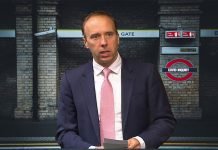Prime Minister Pedro Sánchez addressed the nation on Saturday evening to announce the moves being taken in an attempt to slow the spread of the virus.
Spain reported some 2,000 new coronavirus cases and more than 100 deaths over the last 24 hours. The new figures raise Spain’s number of COVID-19 death toll to 288 with more than 7,700 people infected.
From Sunday on, the country’s 46 million citizens can only leave their homes to buy groceries and pharmaceutical products, go to the bank or hospital, or to take care of dependents. While on the street, they must be unaccompanied at all times, and while they can go to work, most workplaces are to be closed to the public until further notice. Among the exceptions are markets and pharmacies, but also barbershops, dry cleaners and stores that sell tobacco products.
As part of the “state of alarm” measures, Spain’s armed forces, police and civil protection officers, as well as the country’s health workers, are now under the direct command of the national government. Air, rail, maritime and road transport will continue, but are being reduced by between 40 and 60 percent, and flights to the Canary and Balearic Islands, as well as to the autonomous cities of Ceuta and Meilla in North Africa, are to be reduced by half.
The decree signed by the government closes all schools, museums, libraries, hotels and restaurants, and prohibits sporting and cultural activities. The government also reserves the right to take over factories and energy utilities.
#COVID-19 #Coronavirus
Stay at home if you have coronavirus symptoms
Stay at home for 7 days if you have either:
- a high temperature – you feel hot to touch on your chest or back
- a new, continuous cough – this means you’ve started coughing repeatedly
Do not go to a GP surgery, pharmacy or hospital.
You do not need to contact 111 to tell them you’re staying at home.
Testing for coronavirus is not needed if you’re staying at home.
Support Independent Journalism Today
Our unwavering dedication is to provide you with unbiased news, diverse perspectives, and insightful opinions. We're on a mission to ensure that those in positions of power are held accountable for their actions, but we can't do it alone. Labour Heartlands is primarily funded by me, Paul Knaggs, and by the generous contributions of readers like you. Your donations keep us going and help us uphold the principles of independent journalism. Join us in our quest for truth, transparency, and accountability – donate today and be a part of our mission!
Like everyone else, we're facing challenges, and we need your help to stay online and continue providing crucial journalism. Every contribution, no matter how small, goes a long way in helping us thrive. By becoming one of our donors, you become a vital part of our mission to uncover the truth and uphold the values of democracy.
While we maintain our independence from political affiliations, we stand united against corruption, injustice, and the erosion of free speech, truth, and democracy. We believe in the power of accurate information in a democracy, and we consider facts non-negotiable.
Your support, no matter the amount, can make a significant impact. Together, we can make a difference and continue our journey toward a more informed and just society.
Thank you for supporting Labour Heartlands











